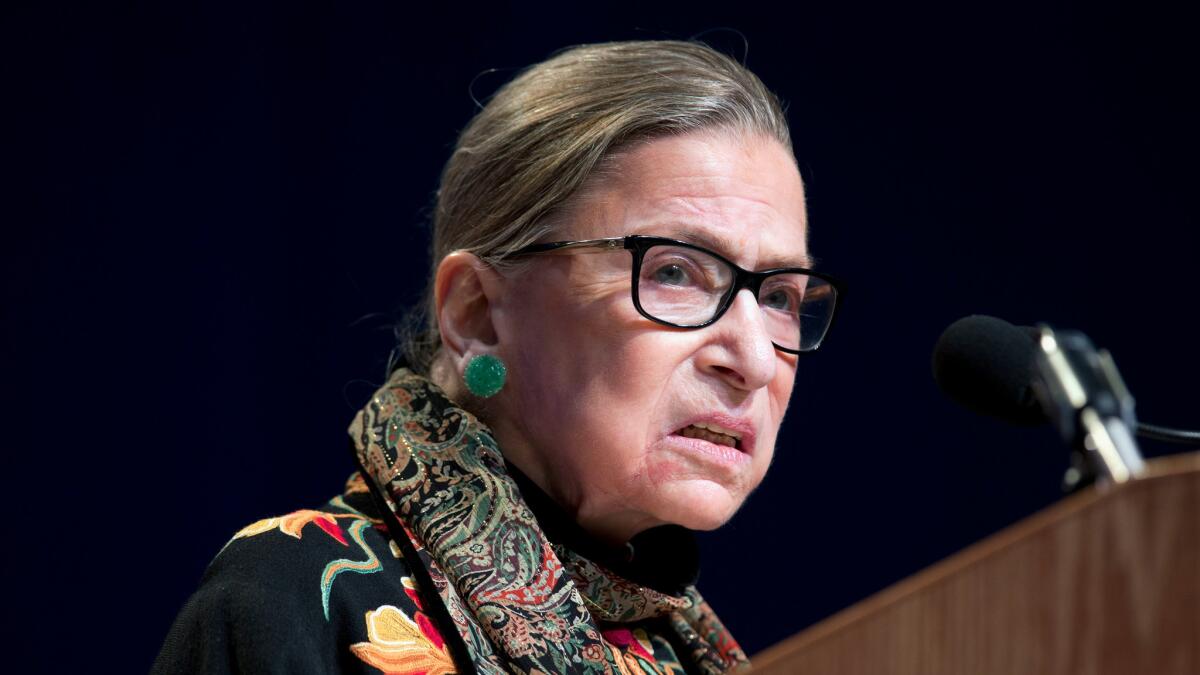Op-Ed: Ruth Bader Ginsburg has nothing to apologize for in her criticism of Donald Trump

Imagine that you are a person with great influence, highly respected and with a powerful voice that commands enormous attention. Imagine that you see the country heading down a potentially destructive and very dangerous path. Do you sit quietly and, if the worst happens, always regret your silence, or do you speak out even if doing so will subject you to criticism?
That is the choice that Justice Ruth Bader Ginsburg faced before she publicly criticized Donald Trump and, unlike most commentators, I applaud her decision. Nor do I think she needed to apologize, as she did on Thursday.
In three interviews, with reporters from the New York Times, Associated Press and CNN, Ginsburg spoke on a wide array of topics.
Much of what she said was unsurprising and not controversial. She expressed pleasure at the Supreme Court’s recent abortion and affirmative action cases, where she was in the majority. She praised President Obama’s nominee for the Supreme Court, Merrick Garland, and said that the court’s work is hindered by the Senate’s failure to consider him.
I wish more of the justices would explain that the Senate’s refusal to consider this nomination, as well as nominations for lower federal court judgeships, is seriously interfering with the functioning of the courts.
Ginsburg knows that too often bad things happen because — as the saying goes — good people do nothing. She knew she had a platform and she used it.
What attracted attention was her sharp criticism of Trump, whom she called a “faker.” She also said that her late husband would have wanted to move to New Zealand if Trump were elected.
Ginsburg is 83 years old and has seen in her lifetime the great damage that can be done by a demagogic candidate who professes extreme nationalism and peddles unsubtle racist and anti-Semitic messages. I wonder whether it is a coincidence that Ginsburg criticized Trump soon after his campaign tweeted a six-pointed Star of David superimposed over $100 bills and a photo of Hillary Clinton, perpetuating the age-old offensive association of Jews and money.
Ginsburg knows that too often bad things happen because — as the saying goes — good people do nothing. She knew she had a platform and she used it.
Uninformed punditry to the contrary, her comments violated no law or ethical rule. The judicial code of ethics says that judges are not to endorse or oppose candidates for elected office. These provisions, however, do not apply to Supreme Court justices. (Whether that exception is reasonable is a separate question.)
It’s true that, conventionally, justices steer clear of electoral politics. But that wasn’t always the case: In 1800, the members of the Supreme Court openly campaigned for the reelection of John Adams. This convention of silence, moreover, is inconsistent with one of the most basic underlying principles of the 1st Amendment: that more speech is better in a democracy because it leads to a better-informed population.
Many have claimed that Ginsburg will have no choice but to recuse herself if a case involving Trump comes to the court. I don’t think so. She was not speaking about a pending case. Besides, Sandra Day O’Connor was widely quoted as saying that Al Gore would be “terrible” for the country, and she participated in Bush vs. Gore anyway. Whatever “should” happen, the reality is that Ginsburg will not recuse herself. It is left to each justice to decide whether to participate, and I cannot imagine that Ginsburg will see her comments as disqualifying. She will feel, rightly, that she can decide specific issues that she has not discussed publicly.
Nor am I convinced that her comments tarnished the image of the court. Is anyone surprised that a liberal Democrat like Ginsburg perceives Trump as a threat to democracy? Did saying it aloud really change that much?
On Thursday, Ginsburg tried to put the matter to rest. In a brief statement issued by the court, she said that “judges should avoid commenting on a candidate for public office,” and acknowledged that her remarks were “ill advised.” In the limited sense that her statements attracted criticism, who could disagree? Otherwise, she had nothing to repent.
Erwin Chemerinsky is dean of the UC Irvine School of Law.
Follow the Opinion section on Twitter @latimesopinion or Facebook
MORE FROM OPINION:
After Nice, it’s official: The campaign’s about fear
Obama is not a scientist. JAMA shouldn’t pretend he is
More to Read
A cure for the common opinion
Get thought-provoking perspectives with our weekly newsletter.
You may occasionally receive promotional content from the Los Angeles Times.










